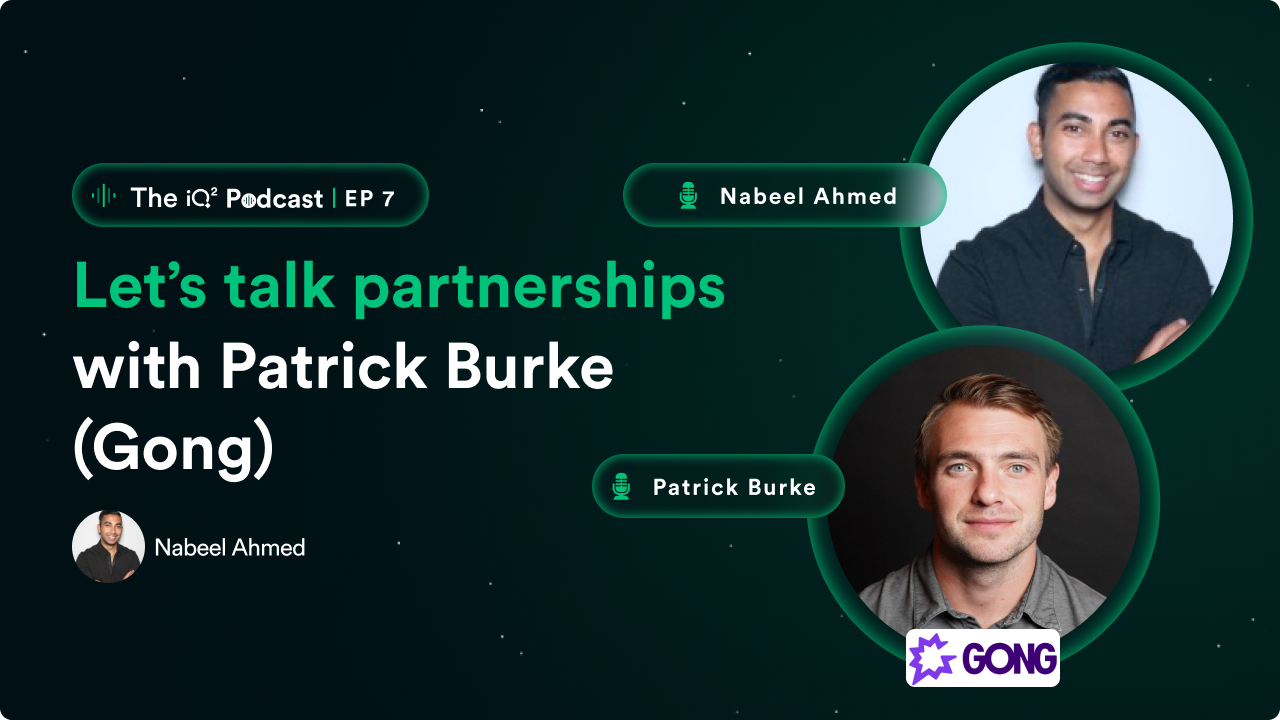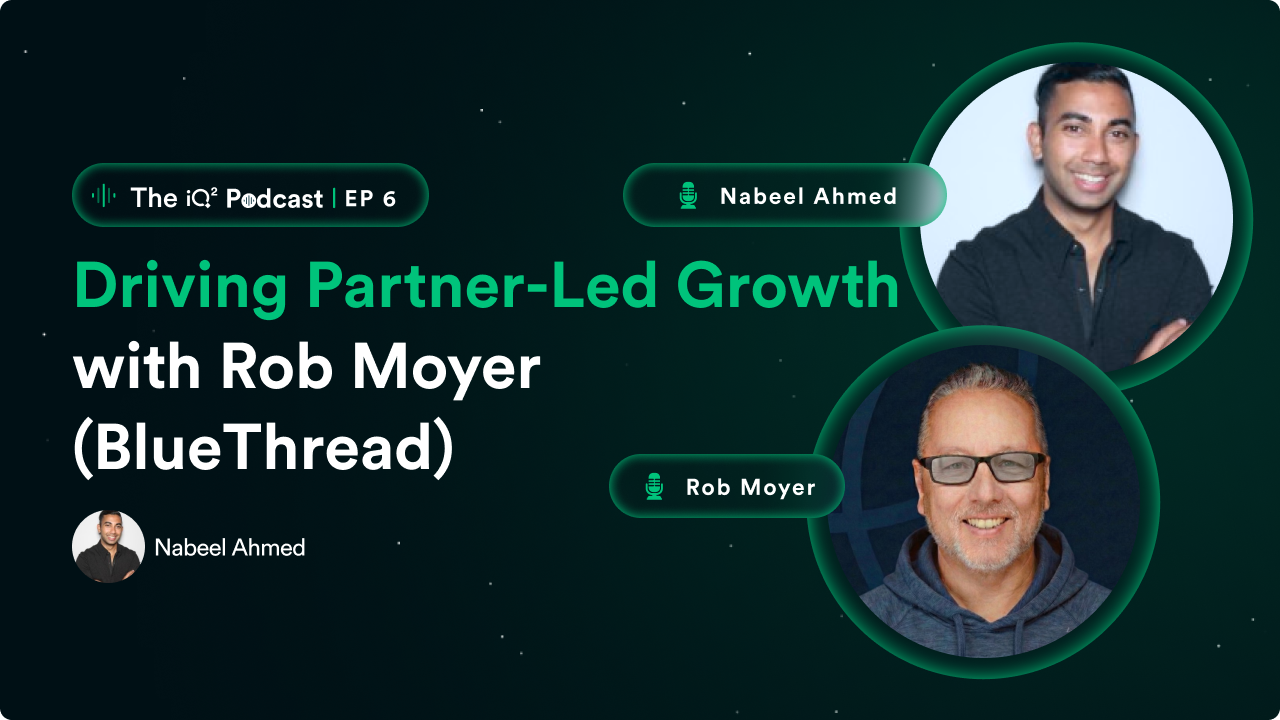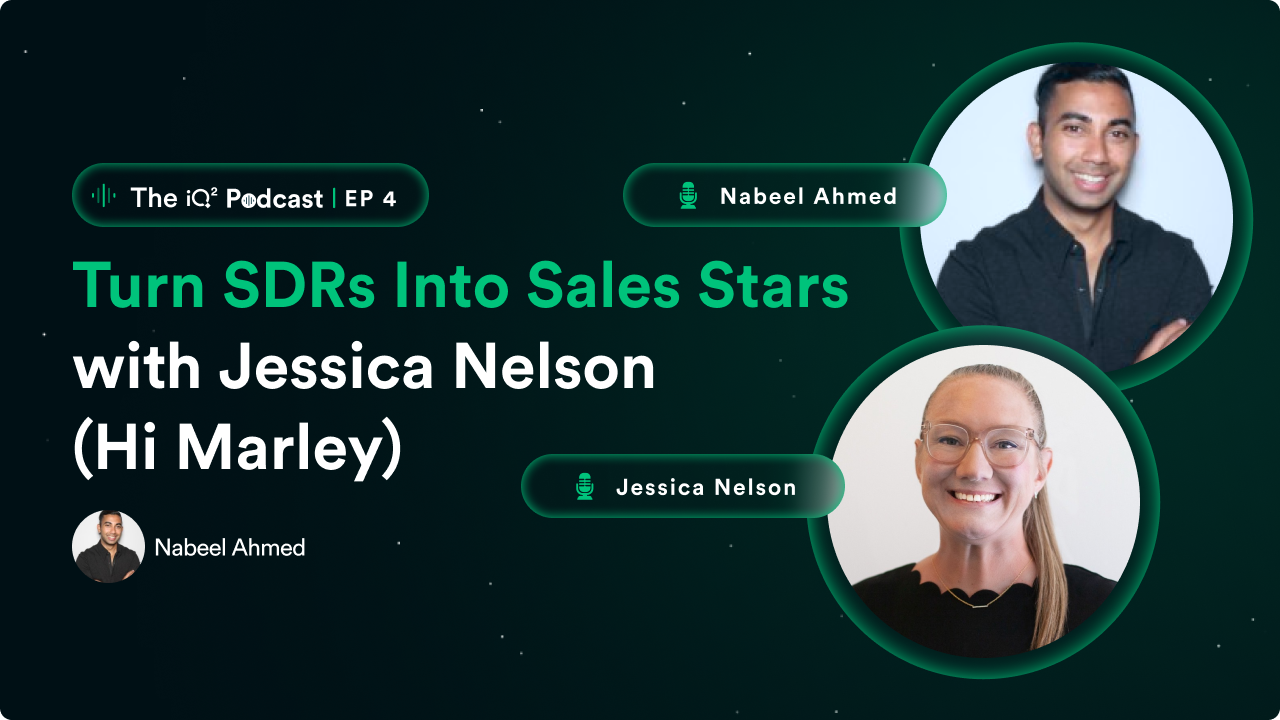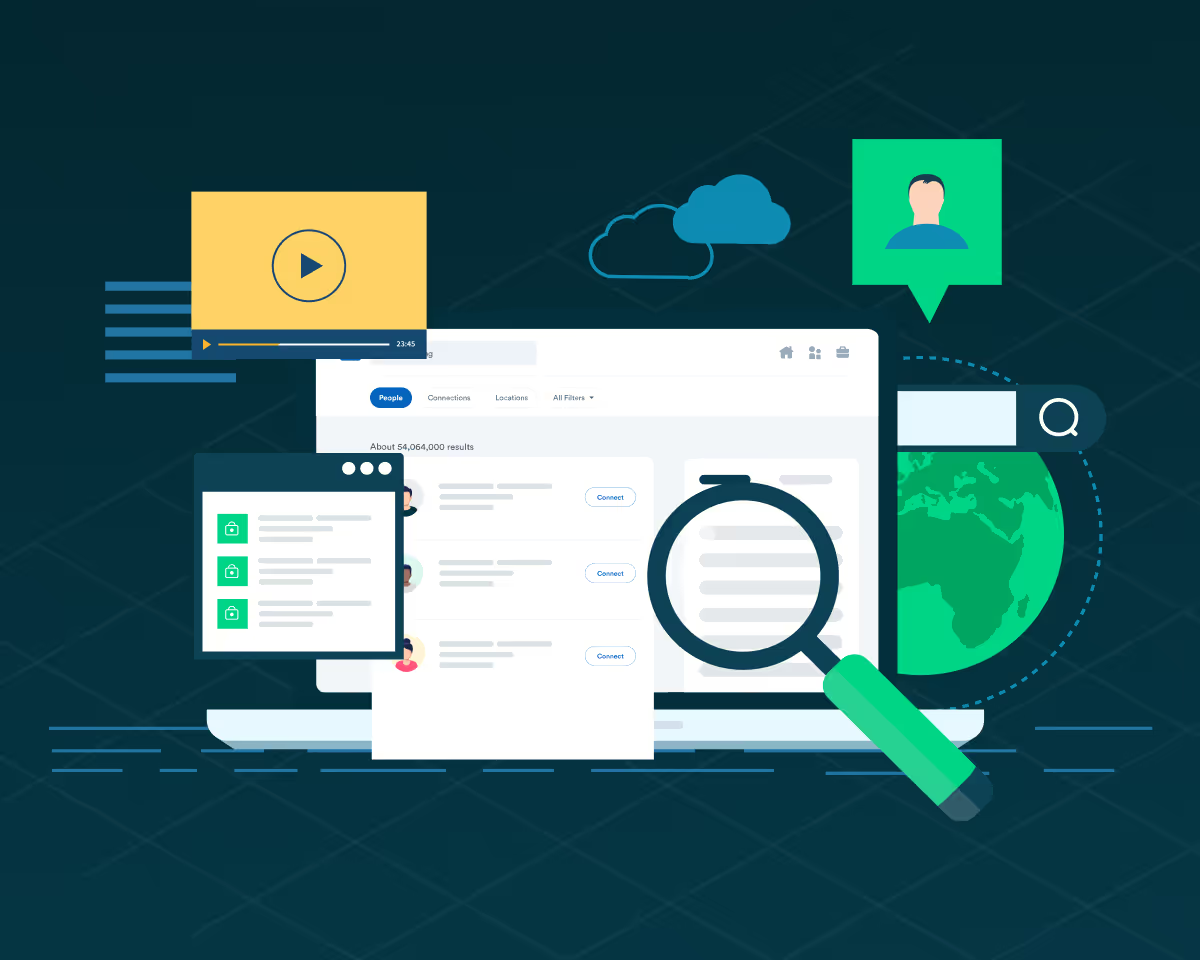Why Classic RevOps Is Dead (and What’s Next) with Amy Cook
In Episode 5 of IQ², Nabeel chats with Amy Osmond Cook, PhD — CMO of Fullcast, longtime marketing leader, professor, and author — about the changing landscape of RevOps. They dive into: Why classic RevOps is broken, the role of AI and private data in shaping GTM workflows, and the death of traditional SaaS and rise of service-driven software.

Align KPIs across departments to eliminate silos and create shared accountability.

Use new tools responsibly, with a focus on private data security and ethics.

Simplify tech stacks to maximize value and cut wasted effort.
Nabeel: Today's guest is Amy Osmond Cook PhD, a marketing executive and communications expert with a proven track record leading high growth companies from Series A through acquisition, including Simplest Pathology, watch and Onboard. She's the co-founder and chief marketing officer of Full Cast, the Go to Market Cloud, and previously spent 15 years as founder and [00:01:00] CEO of stage marketing.
With a PhD in communication and 25 years teaching at top universities. Amy is also a respected voice in business and healthcare communities. Please welcome Amy Cook. All right, we've got another episode of IQ Squared with the amazing Amy Cook. Amy is a multi CMO at multiple technology companies ranging from early stage to pretty large, so she's got a wealth of knowledge.
The crazy thing too, she has her PhD and is also an adjunct professor at BYU Hawaii, which is even crazier. So I am, you know, no pressure talking to Amy here, but she's probably the smartest one in the room today. But without me. Ruining any type of introduction here. Amy would love to pass it off. Tell us a little bit more about yourself, your experience, and we'll take it from there.
Amy Cook: Nabil, that is much too kind of an introduction, but thank you so much. I really appreciate it. It's such a [00:02:00] pleasure to be here. Right before we started recording, we both found out that we're both San Clemente people, San Clemente, California. Love it. There you go. So how fun is that? I've lived in San Clemente for the past 20 years.
Um, with my husband and my five kids and my dog, and it's been a great life and had a lot of fun working on different businesses in the technology, healthcare, and real estate sectors. So, um, I guess a little bit about my background is I grew up in Utah. I got my bachelor's and master's in English from BYU.
Took a little break off, had a couple of kids, went back to school, got my PhD. When I was going back to school, I thought to myself, what am I gonna do? I was a single mom at the time with two kids, and so I thought, oh man, I don't, what am I gonna do to support these kiddos in a way that's flexible? So that's why I went back to school originally.
Then I got remarried. Had a [00:03:00] couple more kids and I thought, all right, this, this is, this is the life for me. Bunch of kids, my husband's in real estate, he's doing well, and I'm just gonna live this life. And then Jeff, my husband, got a job at Lehman Brothers in 2008, one month before they went bankrupt, and then all of a sudden, wow.
I was like, oh, I gotta go back to work. And so, 'cause kids gotta eat, right? Yeah. And so it was in the middle of the financial crisis. And you know, we were pretty stressed out 'cause we had a whole bunch of little kids. And one day Jeff said to me, he came into the room, I remember it so distinctly, and he said, Hey Amy, we got a $10,000 tax return.
Let's have a contest. Let's split it in half and let's see who can make the most money. And I said, you are on. And so I started a marketing business, um, called Stage Marketing, [00:04:00] and Jeff, uh, invested his in real estate. And so we have been, uh, growing our seed money ever since then. Having a fun competition to see who could make the most.
So, yeah.
Nabeel: Who's, uh, who's winning today? I'm
Amy Cook: totally winning. I'm totally winning, except Jeff said that if it, if you go by, um. Price per hour. He's winning. 'cause it's been a lot of work.
Nabeel: Okay, there we go. Your, your, your 20 hour work days aren't, uh, aren't Yeah. Aren't, uh, leveling out the right way. That's right.
Amy Cook: That's right. So, um, as part of this marketing agency that I started, I had the amazing opportunity to be a fractional CMO. And so, uh, one of my clients was Ryan Westwood, uh, in 2012. I was helping him write, uh, some columns for Forbes and we had this conversation and he said, I'm looking for a head of marketing.
And I said, I would absolutely love to join you. I will leave my [00:05:00] agency and let's just go for it. And so, um, I just kind of left the agency running on ice. Uh, it was just like running independently by then. And I did my first, uh, CMO gig. I, it was a wonderful experience. We grew, uh, simplest from, uh, 27th.
Teen series A when I got there all the way through acquisition in 2020, and then I had the opportunity to continue on as the marketing lead at Infosys. Um, leading their Salesforce practice there and loved that. Uh, then I went, you know, went back fully into the agency and had the opportunity to do two more, um, CMO gigs from series A through acquisition.
The first one was pathology watch from 2020 to 2023, and was such a pleasure to work with Dan Lambert, who was the CEO there. And then with Ryan Wells from 2023 to 2024 for onboard. And then I sold the agency and, uh, Ryan said, Hey, let's get the band back together [00:06:00] and let's do full cast. And uh, again, took me about a hot second to say, absolutely, let's go.
So that's a little bit about my background and it's been just an absolute fire hose of learning. That's one thing that you get when you are a fractional C-suite executive is you get a lot of learning because you have to pick things up quickly and you have to make sure that you're, you know, really working hard to understand.
'cause a lot of times people will hire you to be a fractional, but you, they actually expect you to full-time. So
Nabeel: Yeah. And
Amy Cook: that's just kinda how it's,
Nabeel: and the, when it, when you're fractional also, I think, uh. A lot of the issues that you'll typically see is that they expect you to ramp quickly, but they expect you to see results yesterday, right?
There's a reason why, you know, the fractional position is extremely important, is because you bring in a breadth of expertise within the industry, but it's also like, Hey, let's go crazy. Let's move fast. In my opinion, you're [00:07:00] a hundred percent right. The expectation is a hundred percent full-time when you've only told them, uh, a few hours.
But it seems to me, Amy, that every door that opens is because you're doing something right and you're going a hundred percent in and every kind of gig that's going. And that's what I love hearing about your history. Is every opportunity led to another opportunity? Um, yes. With no. With, and I wouldn't say you didn't have a plan.
It's like, Hey, let's just do right by the immediate business and doors typically open,
Amy Cook: well, I think that that is such an awesome way to, you know, characterize what's required of a fractional. You have to go all in because they're trusting you to do your job. Whether or not they're doing, you're doing it part-time or full-time, and they're trusting you to have results that are gonna grow the business.
So quite often, I mean, if I'm being totally honest, I probably have worked between 80 and a hundred hours a week forever, [00:08:00] but I really enjoy it. And so it doesn't really feel like work. So I feel very, very lucky to be able to do that. Um, and so you're right, like doing right by the business. Is the primary thing.
And if you can go all in and you can really focus on developing where you're at and learning everything you can and just being a sponge, it really is true. One opportunity does lead to another.
Nabeel: Yeah. You're the marathon runner running a marathon every week, so, uh, that's what I love hearing and seeing too.
Um, but you're currently
Nabeel: at Full Cast right now. You're the CMO at Full Cast.
That's right. Driving
Nabeel: this business forward. Tell me a little bit more about that. I know we, we talked about fractional, but how is, how is full cast treating you and how are you treating full cast?
Amy Cook: Well, it is so much fun to go from fractional to full-time, you know?
Yeah. This is the first time really, that I haven't had the agency, um, at least on ice. You know, I, I went all in with simplest as well. Um, [00:09:00] but you know, not even having any of those. Those other things that can distract you. It's very liberating and I absolutely love it. It's fun to be able to just dig in really deep.
It's a very big opportunity, but there's also some really big challenges in the market right now. And so, um, if we can help pull together an otherwise pretty fragmented market. It's gonna take more than our company. It's gonna take more than a few companies. It's gonna take a whole industry coming together to set new rules and boundaries and, um, kind of rewrite the way the game is played in technology.
Nabeel: Yeah. Let, let's talk about that fragmentation because you know, we, we see it a lot, right? We, uh, being at Lead iq, we're a sales tech platform. That supports a lot of, you know, revenue teams that are looking to kind of outbound and grab contact information. So data at its core, and what's crazy with the landscape that we're seeing is we're [00:10:00] seeing that with the advancements of LLMs, the future of ai, it's easier to spin up a business to showcase advanced workflows.
Um, but it's hard to really kind of. Break through that chasm. Right. Um, when it comes to scaling that business, when I see forecast, what's great is that you guys are advanced in deep experts in kind of the, the segment that you guys are currently in. Uh, predominantly rev ops, and correct me if I'm wrong in any of this stuff.
When you see that fragmentation happening, I almost think rev ops is, is a hot topic these days. Right? Um, so how are you dealing with the fragmentation? And number two is how are you dealing with this new wave of rev ops enthusiasts coming into kind of the, the technology workforce?
Amy Cook: Well, thank you for asking.
Um, I do think those two questions are very interrelated because most of us who are very interested in revenue operations have [00:11:00] experienced the gut-wrenching pain of siloed departments. I mean, haven't you been in an department Nabil, where you're like, ah, if only my KPIs were aligned with my depa, other department leaders, and if only we could work together and if only they wouldn't screw me over and say that my leads didn't mean anything and if only they would pick up my leads and if only that marketing would give better leads.
And um, you know, there, there's a lot of real emotional pain that comes from those siloed departments. And what, so my PhD is in organizational communication with a focus on organizational rhetoric. And as part of that, we went deep in our discipline into how organizations were formed, how they're currently constituted, and how they are, you know, moving forward and changing and growing through the processes of communication.
So what became very apparent to me in this new business is that the old way of bureaucracy, something that worked [00:12:00] very well at the time. During the Industrial Revolution is no longer a viable business model, and that's why you're seeing so many revenue operations people coming together saying organically, this doesn't work anymore.
There has to be a better way for this. And it's really, really exciting for me to be able to be part of that revolution and to say, not only are we building a new industry, we're completely changing the rules of the game of how we do business. So I think that you, you are gonna see a lot of cowboys in rev ops like us.
You're gonna see a lot of people who wanna change the rules and there are gonna be some winners and there are gonna be some losers, and we wanna be the winners.
Nabeel: Yeah. Well, I, I'll tell you this, you're positioned right before the wave, right? So you're gonna catch that mm-hmm. Wave as it hits the market. Um, I'm excited to kind of see what you guys are gonna be doing at Full cast too.
And, you know, we're, we're at lead iq. We're trying to get a little bit closer.
Amy Cook: Thank you. Well, I [00:13:00] love what you're doing at Lead IQ and we love being your customer. Your, your data is amazing. The way that you're making the workflows so easy for us. And your data is very high quality too, if I may say. Yeah.
Um, because we data providers as well, so in, in fact, it was so funny too because, um, one day somebody showed me their data. Um, platform, and I know that you guys do a lot of, uh, of partnerships too, and somebody showed me their data and then, and the, um, the way that your work, they were showing the workflow and the way that they were positioning it, um, I said to 'em, are you guys just re-skinning lead iq?
We have lead iq and they were like, yes, actually we are because they're the best. And I said,
amen.
Amy Cook: I love it.
Nabeel: Hey, I, I love hearing that. That's a, you know, I didn't pay Amy to say any of this, so We do, uh, we do appreciate it, but, uh, but it's, it's a, it's a beautiful thing, right? 'cause you know, we, we don't know what we don't [00:14:00] know either, right?
I think the, the best thing and the core of what we have as a culture is, you know, stay humble, stay curious. Through everything that's happening. And I think the market is transitioning and changing so quickly. Um, and that's why, you know, when, when we first met, it was initial conversations around like, Hey, what do you do?
What do we do? We've heard of each other. Mm-hmm. And we should probably try to figure out how we can work together. Um, and that is funny how, how that type of conversation happened. And I think you accelerate maybe a quarter, maybe two quarters, and the landscape has already dynamically changed. Right? Like I would almost tell you that.
That within a stack of all the noise that's happening, rev ops is the great unifier when it comes to go to market team.
Amy Cook: Yeah, absolutely. We, we were, uh, doing a, a original study. We have a book coming out in September called the Rev Ops Advantage. It's, uh, being distributed by Simon and Schuster and Skyhorse Publishing reached out to us.
They did Frank Salman's book, amp It Up and [00:15:00] Snowflake's book, um, busting Silos and some of those others. And so they reached out to me and said, um, Hey, we want someone to write the definitive book on revenue operations. Would you be interested? And again, hot second. Absolutely. You know, shout out to Mike for, for, uh, for reaching out.
But, um, what is really interesting about that, when we did, uh, some original research to support that book, um, people already have several AI tools that they're trying to manage.
Mm-hmm.
Amy Cook: They already have a stack of, like, even smaller businesses have a tech stack of 13 to 15. Right. And in this market right now with efficient growth, there's a mandate among many, many, many organizations to reduce your tech stack by 20%.
So what does that mean? You have to do? You have to get rid of the, the fat, you know, you have to cut what's not working. You have to get rid of all of your COVID [00:16:00] tools that you bought because you wanted to stay home. And now, now we're had to stay home and now we're going back to work more and more. And so I do think you're right.
Um, with the, with all, you know, you've got post COVID, you've got. A distributed workforce that kind of works and kind of doesn't, and you've got AI coming into the mix. We are in the middle of just an absolute hot mess right now.
Nabeel: I love that because it's a hot mess. And I know we've talked about this to Naum is.
The opportunity is so crazy because of the fact that it's such a hot mess.
Amy Cook: Absolutely. Right? Who's gonna fix the hot mess? Your rev ops people, that's who's gonna fix your hot mess?
Nabeel: And, and that, and, and that is, and again, poised for success. The wave, if, if not, is already kind of coming down. And you're right and on top of it, um, you know, which is, which is absolutely beautiful when you think of the landscape, you know, [00:17:00] of the hot mess.
How do you predict the hot mess, transforming and evolving in the next, you know, 24 to five years?
Amy Cook: You know, I had a really awesome opportunity to work with Simon Chan at Firsthand Ventures and mc, his AI conference in May. Um, that to me was absolutely fascinating. A few things I learned there, any AI company that you can think of was there and they had their leads and they had their, um, some of their go-to-market leads, a lot of their technical leads talking about the future of ai.
And, uh, one, one thing that was very apparent to me is that the structure of how we're going to be, to be, uh, developing AI tools is really being set. If we look at it, the way that that public data is accessed right now is structurally very similar to, um, everyone else, honestly. And now the opportunity really lies within private data.
How do we make AI tools work for our own private [00:18:00] data in a way that is secure and ethical? How do we make the public data more ethical and regulated? That's a whole other field that's gonna be coming down. So the way that I see the market right now is when it comes to public data, everything's out there.
It's just a matter now of how do we use it responsibly and ethically. When it comes to innovation, we're gonna see a lot more AI being developed, especially in the private sector, uh, for, for private data. And then we're going to be able to, um, you know, use what's already being built with those large LLM models and other things.
We also are gonna see some more robotics happen. I think I, I don't think that humans can get away from the idea of creating as close to themselves as possible. I just think it's, it's a, mm-hmm. It's a destructive tendency within ourselves, but I think it's gonna happen. So, um, I think that we're gonna see a lot of changes based on AI and the only way that that kind of stuff is going to work.
Is if we're going to be [00:19:00] able to integrate many, many, many different pieces and parts and departments.
Nabeel: Yeah, I, you know, I, I love that 'cause some people saw or forecast, this is the death of SaaS if you're not building any type of AI native mindset. Very focused on results and then the transformative nature of how fast AI technologies are coming out and how that's getting.
Permeated into physical items such as what you mentioned, robotics, to kind of help and deal with the repeatable tasks that everybody does. Mm-hmm. Um, is an interesting take because it is the first frontier retail for AI and, and physical ai. Right. Um, absolutely. Is it restaurants, you know, x, y, Z. So I think there, there we're gonna see a lot of different changes, and I completely agree that private sector is the Guinea pig.
Well understand what works, what doesn't work. Mm-hmm. Mm-hmm. What the hallucinations might happen, and hopefully it's not too crazy, uh, that would, that would occur [00:20:00] when it comes to the statement I made before. Right. And, and death to SaaS is a very clickbait statement, but it, it's, what do I mean is death to traditional software as a solution?
Mm-hmm. We even see pricing and business models change from per seat to consumption. The interesting thing here is how do you see the landscape changing? Do you see the thought process of traditional SaaS businesses getting gobbled up by AI native businesses that are expanding quickly? Or do you see kind of the larger companies create defensibility in moats by eating up the long tail of point solutions that might be a threat to them?
Amy Cook: Well, that's a really, really. Interesting question and a very like, very smart question loaded question. Yes, because you, you see the battle going on right now, right? You see Salesforce hanging on trying to like revalidate their platform by, by inserting agent force into everything, right? [00:21:00] And then you see people saying, no, no, no, no.
This is a death of sas. And we're going to be using data lakes rather than CRMs in order to access our data in a way that is going to be proactive and predictive and accessible. And I think there's gonna be a big battle for that. And I think that Salesforce understands that the battle. To the battle for the traditional CRM has already been lost, which is why they're going so wholly into Agent Force and transforming their own business.
Kudos to them. You know, we've been their partner for many years and I think they're brilliant. But, um, but I do think when it comes to software as a service, when Chat GPT launched, that was the death nail to SaaS.
Yeah.
Amy Cook: It now has to be services software. You don't go into chat GPT and say, give me an empty shelf from which I can check my data.
You're going to chat GPT and, and, and Gemini and Grok and all the [00:22:00] others, and Claude and saying, think for me, do this for me. Right? And so that, that transition is really important. And the, the thing that I'm excited about with Lead IQ and about your business is all of that hinges on good data. You can't run AI without good data.
You can't run AI without clean data. And that is another reason that revenue operations is so ridiculously important right now, because who's going to clean your data? You can't have AI depend on clean data to clean your data, right? This is, this is something that, that people are going to have to do as a baseline in order to set that up.
I was also the, uh, chief marketing officer of a, an, uh, an elite AWS partner called nClouds, and that is one of the hallmarks of AWS is clean data, is the prerequisite for [00:23:00] AI and for using your AI, for having valuable ai. So anyway, I, it's a, it's an absolute pleasure to be partnered with you guys because of some of those, um, you know, the important prerequisites of even being able to use it.
But I would like to hear your thoughts on that question. You asked me, what do you think?
Nabeel: Yeah. You know, I think there is a, it we're in a pivotal point to understand who's gonna win. Right. Um, and I think you have both arenas, and this is, it's honestly a safe answer because I don't know, I can't predict the future specifically on it, but I think the platforms will get wider, so more horizontal to be a layer on top of any type of LLM.
Right. So like when you used to, I come from Intel, so we think of the hardware stack and then software is built on top of that. Mm-hmm. And then when you think of the tech stack. You think of, you know, either a data lake, A CRM, and then your point solutions that sit on top of that.
Amy Cook: Mm-hmm. And what
Nabeel: you're seeing is that every [00:24:00] customer or or platform, you know, think of your sales platforms like Outreach and SalesLoft and even Gong.
They're still consistently trying to go wider. But create some specialty associated with what they try to do. But these point solutions are still capturing attention.
Amy Cook: Mm-hmm. And they're
Nabeel: still capturing the ability to kind of be implemented very quickly.
Amy Cook: Mm-hmm. Like
Nabeel: every business out there, in my opinion, AI first Native Point solutions, even those stuff that's coming out of YC today, which I keep a very close stab on, are providing value to people by saying, I specialize.
Even from the contextualization of your data on X, while platforms are saying that AI feature I'm gonna insert into my business, but it's not gonna be the core focus of what I do.
Amy Cook: Mm-hmm. Right.
Nabeel: So I think as we continue to grow and businesses get more and mature, I think tech spend is going to increase.
Amy Cook: Mm-hmm.
Nabeel: [00:25:00] And uh, full-time employee spend is gonna decrease.
Amy Cook: Which
Nabeel: provides a massive more value for people to be like, maybe I'll try the specialized point solutions that can then feed into a lot of these larger platforms to then contextualize that a bit more. And, and, and that's that. My take there is, the reason is I could probably Jimmy and AI solution for everything under the sun using the tools that are out there.
Zapier, NAN. Um, cooking into my gong calls and then kind of coding these into cps, into a lot of these l LLMs, right? Mm-hmm. The problem is once that breaks, what happens? Mm-hmm. Right? Um, and it will, and, and things are adapting, so you almost would shed off some additional capital to a lot of these point solutions to maintain the validity of a lot of these solutions as you continue to grow because you actually have less people doing more.
Amy Cook: 'cause of these
Nabeel: tools.
Amy Cook: Mm-hmm.
Nabeel: [00:26:00] So my, my 2 cents, and that's where I would put my money on, on that, is to say that the platforms will try, we'll do a good general job, but the point solutions would be more advanced and specialized and will actually provide more value. The problem is it would be siloed. And not necessarily contextualized as well as it should be.
Amy Cook: Mm-hmm. That makes a lot of sense. I like that. I like that thought. I'm thinking about that first. So
Nabeel: Amy. I know, I know. I was like, I was like, I was thinking about it too, and I was like, huh. It's interesting. And, and it's funny because I've been talking to a lot of businesses specifically around that too.
And, and you know, I think time will tell who will win out, but it, it's also where the money is going to flow, right? Mm-hmm. Because a lot of these point solutions don't exist without some sort of capital infusion. I know it's getting easier to build businesses and it's getting cheaper from a feature set and technology perspective to start businesses, but there is going to be this series BC scalability [00:27:00] issue.
Mm-hmm. Where capital will flow. And I think we're in the early stages of a lot of these companies. Once you see a lot of these point solutions maturing and realizing they need capital for scale, we'll understand where the market trends will occur. Mm-hmm. And I think it will be a forcing function of capital and what a, a lot of, you know, maybe the Silicon Valley world will think they'll gain the most value.
Amy Cook: Right. I love that. Um,
Nabeel: Amy, I know we, we talked a lot, um, but I do appreciate you jumping on. The IQ Squared podcast blessing us with your presence and your knowledge.
Amy Cook: Oh, it was my pleasure. Thank you so much. Yeah.
Nabeel: For everybody that's listening, and I always ask this for everybody, is we wanna kind of bridge the gap between having conversations with the experts in the field.
How can people reach you? Amy, how can I have conversations with you? 'cause I'm sure people would wanna have interactions, understand how you feel about rev ops, or even just take advantage of the full cast solution.
Amy Cook: Oh, absolutely. Um, if anyone would like to reach out on [00:28:00] LinkedIn, um, my profile is Amy Osmond Cook and, um, amy@fullcast.com is my email and would love to connect with you there.
Nabeel: Alright, well thank you Amy, again, appreciate everything and we'll chat soon.
Amy Cook: Thank you so much.
Meet the Guests
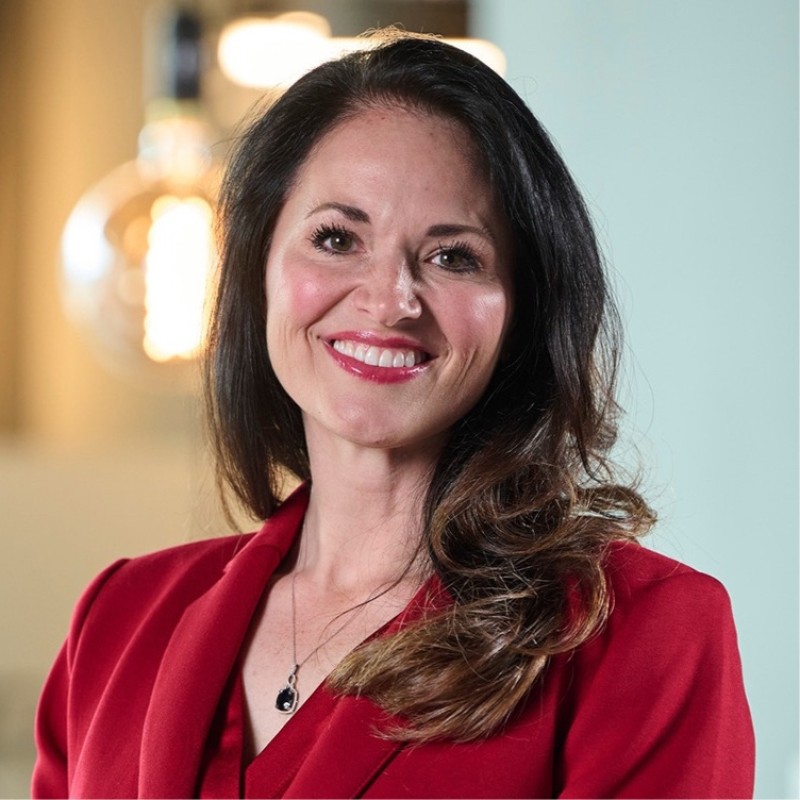

Amy Osmond Cook, PhD, is a seasoned marketing executive and communications expert, recognized for her innovative strategies in technology, healthcare and real estate marketing.








